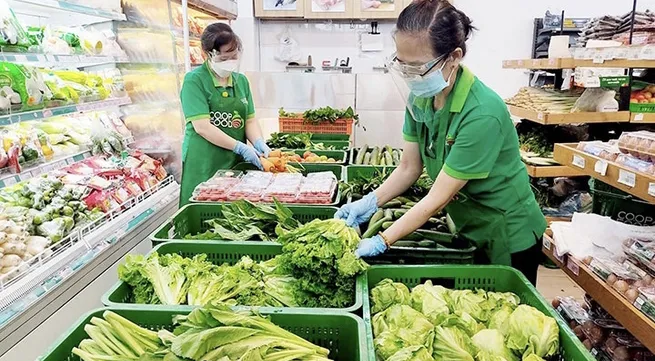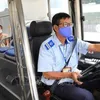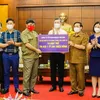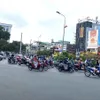Ho Chi Minh City gradually reopens activities while controlling the pandemic

This was a decision that met the local people’s aspirations for economic recovery while controlling the pandemic.
On September 30, the Ho Chi Minh City People's Committee officially announced its directive on continuing to control and adjust COVID-19 prevention and control measures while restoring and developing socio-economic activities step by step. Accordingly, the city will ease social distancing rules and permit the resumption of many activities and services related to production, trade, business, culture, arts and sports. However, the reopening will be strictly implemented in accordance with the motto that the reopening must be associated with the safety.
The reopening based on caution and safety
To date, Ho Chi Minh City has recorded more than 380,000 infections, accounting for nearly 50% of the total in the country. Around 35,000 patients are treated while nearly 15,000 people have died from COVID-19. The City’s epidemic prevention and control has achieved many important results and the medical system has been strengthened and consolidated. The number of hospital admission, severe disease and death has decreased continuously. More than 95% of people aged 18 and over have received at least one vaccine shot and 45% have been covered for their second shot.
The city has piloted a number of socio-economic recovery activities in Districts 7, Can Gio and Cu Chi to ensure safety. The locals’ awareness of epidemic prevention and control has been raised. However, the rate of people getting vaccinated in the provinces of the southern key economic zone is still very low; at the same time, the number of people receiving second a second dose of vaccination against COVID-19 is not high. Therefore, the authorities’ decisions and policies on economic restoration must be considered carefully so that they are suitable for the whole region.
The issuance of the new directive aims to enhance measures to curb the virus towards reducing the number of hospitalisations and minimising the deaths; giving priority to protecting the people’s health and lives; consolidating the medical system, notably at grassroots levels; partly restoring and developing socio-economic activities in a safe and effective manner; ensuring social security for people; and bringing people’s lives into a new normal. Vice Chairman of Ho Chi Minh City’s People Committee Le Hoa Binh noted that after September 30, the city will continue to control and adjust the anti-epidemic measures and gradually ease the social distancing rules according to the pandemic’s situation and the safety assessment under the guidance of the Ministry of Health. During the process of implementation, the City’s authorities will continue to make appropriate adjustments, depending on the epidemic’s development, he added.
The city’s People’s Committee asked the people’s committees of the districts and Thu Duc City to develop and carry out detailed plans to implement the directive, based on their actual situation. Interdisciplinary groups must be established to make regular and unscheduled inspection and supervision of epidemic prevention and control at production, business and service facilities in the localities in order to strictly handle case of violations.
Businesses are ready
Nguyen Thanh Hung, the owner of Saigon Steel Machine, an industrial machine manufacturing facility in Hamlet 4, Xuan Thoi Thuong Commune in Hoc Mon District, said: “I am verypleasure at the plan announced by the City People’s Committee on reopening economic activities with a clear roadmap so that people and businesses can be proactive in their lives, production and business. However, the authorities need to reconsider theCOVID-19 rapid tests that have been paid by businessthemselves. Accordingly, the testing frequency should be extended to 14 days per test for people who got two full shots of vaccine and the State agencies should support the enterprises with testing costs.”. Moreover, the authorities should carefully consider the opening of many relevant industries in the supply chain to help the economic activities operate smoothly, Hung added.
Regarding the supply of essential goods, Sales Director of Saigon Union of Trading Co-operatives (Saigon Co.op) Do Quoc Huy said that the total volume of essential goods that the distribution system under the Saigon Co-op has supplied to the markets around the country reached around 1.500 tonnes per day. In order to ensure a stable supply of goods in the coming time, Saigon Co.op has worked closely with suppliers in many regions and localities. On that basis, the business has stored nearly 65,000 tonnes of essential goods for Ho Chi Minh City and other localities until October 2021.
According to Chairwoman of Food and Foodstuff Association of Ho Chi Minh City, Ly Kim Chi, the food enterprises are preparing the provision for the market during the upcoming year end and Tet holiday; therefore, they are in need of additional capital. The businesses have run out of financial resourcesbecause they had to implement "3 on-site" models and suffer high input costs while remaining the selling prices to share difficulties with people.
Chairman of the Ho Chi Minh City Business Association (Huba) Chu Tien Dung said that the banking sector should effectively implement policies related to restructuring debt repayment terms; exempting and reducing interests and fees to support customers affected by the COVID-19 pandemic; and enhancing the connection between the banks and enterprises and price stabilisation programmes. The bank sector also need tothoroughly grasp and promptly remove the difficulties of the businesses, notably procedures on credit; make policies to give aids of working capital loans for production and business activities; guarantee the payment of raw material purchase contracts with interest rate of 0% for businesses affected by COVID-19; and simplify procedures on giving preferential loans and extending debt payment time.
Regarding tax policy, Dung said it is crucial to reduce 50% of corporate income tax (CIT) payable in 2021 and continue to reduce 30% of the CIT in 2022 and 2023 fiscal year for the enterprises with revenue below VND200 billion per year. In addition, a 50% reduction of value added tax (VAT) in the last three months of 2021 and the years 2022 and 2023 as well as the refund of VAT in exports to the enterprises within one month after they complete tax refund procedures should be applied. The business households need to enjoy a 50% reduction of arising payable tax amounts in the third and fourth quarters of 2021 and the total amount tax payable in 2022 and 2023.
It is also necessary to exempt personal income tax for employees who earn income from wages and salaries that are subject to the low levels of tax payment as well as not charge personal income tax for direct cash aid expenditures for employees in the implementation of epidemic prevention and control and “3 on-site” models. Chu Tien Dung asked the City Department of Customs to rapidly coordinate with relevant agencies to timely remove difficulties and obstacles in export and import activities; maintain the quick response groups for the custom clearance of imported and exported goods 24/7; and promote the effectiveness of working groups to support export and import businesses.
Tags:





